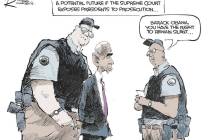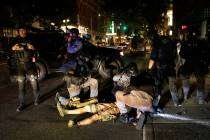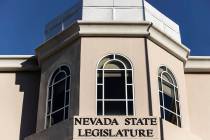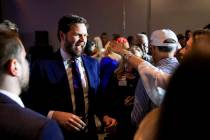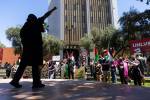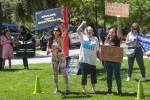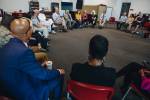EDITORIAL: UNLV’s First Amendment ranking improves
Nevada’s underperforming K-12 schools aren’t the only campuses stuck with low ratings. Higher education has its problems, too, particularly when it comes to free speech at the University of Nevada, Las Vegas and the University of Nevada, Reno.
Since 1999, the Foundation for Individual Rights in Education has been rating hundreds of public and private colleges based on their commitment to free speech, using red, yellow and green lights. (Think of a traffic signal controlling the flow of expression.) For years, both UNLV and UNR had been stuck on a red-light rating with FIRE because of multiple policies that conflict with First Amendment protections.
Recently, though, UNLV’s rating improved to a yellow light.
FIRE noted in December that UNLV’s statement on diversity was a major factor in its red-light rating, as the statement prohibited disrespect, which is highly subjective and ostensibly prohibits core political speech. Samantha Harris, director of policy research for FIRE, said UNLV recently amended the statement, making respect aspirational rather than mandatory, which bolstered the school’s rating.
“FIRE had been advocating for this important change for a long time, and we’re very pleased to see the university has amended this policy. And our rating change reflects that,” Ms. Harris said, while noting UNLV also amended its computer use policy to dial down an overly broad ban on sending offensive messages.
A statement from the university read: “UNLV respects and protects the free speech rights of its students and employees, and the university will always strive to be a place where opinions are freely expressed within the bounds of federal law.”
UNLV would be wise to put its foot to the floor and run that yellow light in pursuit of a green-light rating, following the lead of several schools around the country, most recently Purdue University. Student government leaders, assisted by FIRE and with the backing of Purdue President Mitch Daniels, eliminated the school’s speech-related codes to comply with the First Amendment. Then Purdue went a step further, adopting a statement from the University of Chicago’s Committee on Freedom of Expression, which guarantees all members of the campus community the ability to speak and express themselves freely.
That’s good news. The bad news, as noted at thefire.org, is that Purdue became just the 21st green-light institution among more than 400 in FIRE’s ratings database. Although the number of green-light schools has grown recently — George Mason University joined the club just a week before Purdue, and the University of Florida tossed all its speech codes last year — it is still embarrassingly low.
One reason for that is the lamentable trend of colleges nationwide touting diversity of people while trampling diversity of thought — particularly from those who don’t toe the politically correct line. Look no further than the current graduation season for proof: The Washington Times’ Jennifer Harper reported that among the top 100 campuses in the nation, liberal commencement speakers outnumber conservatives by a 6-to-1 ratio, according to a survey by the Young America’s Foundation.
Then you have the dichotomy of recent developments at the University of Colorado, Boulder and Boston University. Colorado launched its Bias Incident Reporting program, which it says is meant to “address the impact of demeaning and hurtful statements as well as acts of intolerance directed towards protected classes as defined by our university policy.” Feelings hurt by something a classmate said? Report it online! The Stasi would be proud. Meanwhile, at Boston U., professor Saida Grundy, who is black, has been criticized for her racially charged tweets, including one in which she wrote, “why is white america so reluctant to identify white college males as a problem population?” Is the esteemed sociology professor headed to the bias incident gulag? Not likely.
Boston University — which not surprisingly has a red-light rating with FIRE — and other schools should make no effort to monitor or regulate controversial, offensive expression such as Ms. Grundy’s. The First Amendment protects such speech. But they can’t impose a double standard that punishes other faculty or students who make statements that, for example, might offend Ms. Grundy. Her views make a powerful case that Boston should dump its repressive speech code.
UNLV’s administration should be commended for taking steps that show a broader commitment to free speech, but this cannot be the finish line. Under new President Len Jessup, UNLV has a great opportunity to move into an incredibly elite group of universities — schools that don’t just talk the talk on free speech, but walk the walk.










